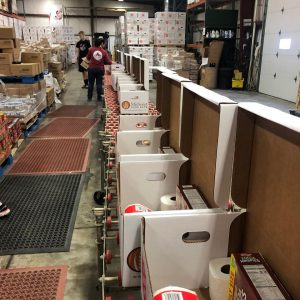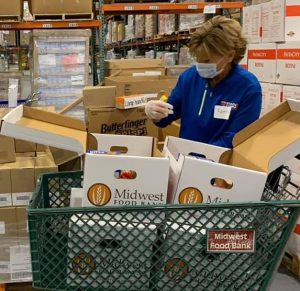Unprecedented need strains state’s largest food bank
By Holly Eitenmiller For Chronicle Media — April 28, 2020
Of the $300,000 which was awarded to Midwest Food Bank from the Illinois Covid-19 Response fun, one-third of the funds will be portioned to the Morton Tender Mercies program, which provides nutritional ready-to-make meals to all 102 Illinois counties. (Photo courtesy of Midwest Food Bank)
An unprecedented number of people are dining at home.
Many are children, most of whom have parents who are now either unemployed, laid-off or are struggling to afford child care that they otherwise wouldn’t have needed if schools were in session.
As the grocery supply chain struggles to meet the overwhelming need the COVID-19 pandemic has spawned, Illinois’ largest food pantry supplier, Midwest Food Bank, is straining to meet a staggering demand. On April 16, however, the organization was granted $300,000 in funds from the state’s COVID-19 response fund.
“My goodness, this is such blessing for us right now. The food supply chain is so challenged,,” MWFB Executive Director Monica Scheuer said. “Stores are trying to keep their shelves full, distributors are being asked to supply more food and manufacturers are being asked to supply all those distributorships. So all three of those touch points affect what food we get that’s donated.”
As a result, MWFB is now in competition with the grocery stores, and must purchase the food and essentials that would ordinarily be donated to them. It was just a matter of days after staff applied for the grant that the state issued its approval. The money, she said, will be used to buy food.
“I was pretty surprised. I know that we applied of within days of when it was announced. It was very quick and it was the second round of those moneys going out. I don’t believe we applied in the first round,” Scheuer said. “This is just huge for us right now, and the money will stay in Illinois.”
Here’s where it will go. The $300,000 will be divided evenly between MWFB’s three divisions, Morton, Peoria and Normal. Of the 102 Illinois counties, the group’s headquarters in Normal manages 62, while Peoria handles the remaining 40. The Morton division is dedicated to the Tender Mercies Program.

Volunteers at Midwest Food Bank must work in smaller groups to maintain proper social distancing and prevent the spread of the coronavirus, a difficult task in the face of the increasing need for food and essentials. (Photo courtesy of Midwest Food Bank)
“The Tender Mercies Program is very important because it is simple ingredients for wholesome, easy-to-prepare meals, that only cost us 30 cents a serving to package,” she explained. “One packet feeds around four people, and it’s packed with protein and fiber”
MWFB distributes food to partner programs that either supply the network of smaller food pantries throughout the state, and directly to the needy. Since the onset of the pandemic, however, many smaller food pantries have closed, and these partner programs are working strenuously to meet the needs of those in areas where the pantries have shuttered.
“Food access has grown limited as food insecurities are growing. The conundrum is that this is happening all over. Food pantries and programs are closing down because so many people who are running them are elderly volunteers who are considered compromised. Many rural communities may have only had one pantry, and now there are no resources there at all.”
Additionally, many dine-in restaurants are struggling to remain open with curbside service, while countless others are closed until further notice. Rather than toss good food in the trash, many restaurants, such as Bob Evans, supply local food banks with overflow stock. That food source has now slowed to a trickle, if not come to a complete stop.
Scheier said she is confident that the grant money will bridge the gap and provide sufficient access to the strained food supply. The COVID-19 Response Fund is chaired by Gov. J. B. Pritzker’s sister and former U.S. Secretary of Commerce Penny Pritzker, and provides flexible funding to non-profit groups to supply resources to those most impacted by the pandemic.
During its first round, on April 8, more than $5.5 million was granted to these groups. Two weeks later, in its second round, an additional $4.8 million in funds were handed out. The program was formed in an alliance between the United Way of Illinois and the the Alliance of Illinois Community Foundations, and collaborated by the Office of the Governor.
For more information on that program, visit www.ilcovidresponsefund.org. To learn more about MWFB, its resources and ways to volunteer or donate, visit www.midwestfoodbank.org.







